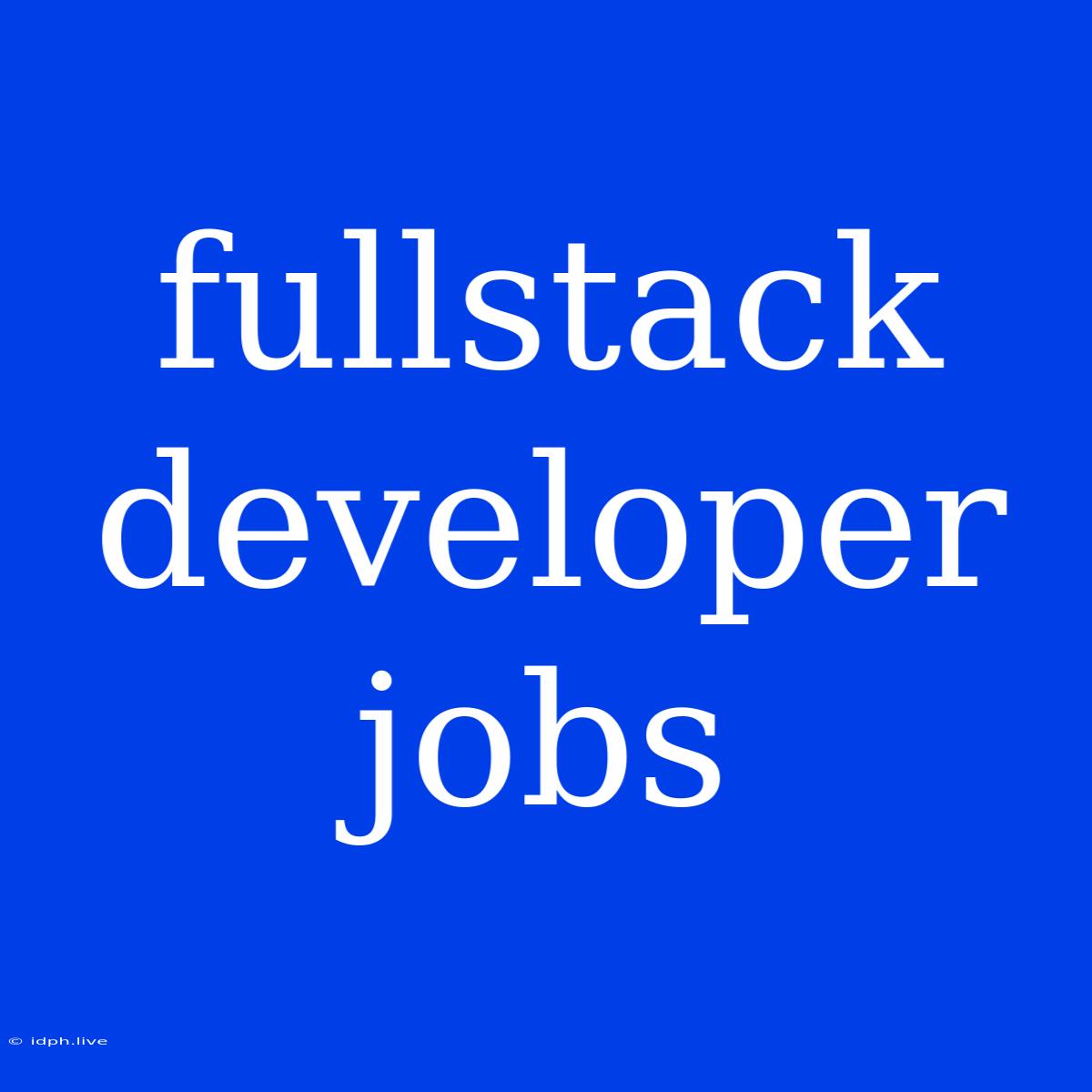Full Stack Developer Jobs: A Comprehensive Guide
Full stack developers are highly sought-after professionals in the tech industry. They possess a versatile skillset that allows them to work on all aspects of software development, from front-end to back-end. If you're interested in a career as a full stack developer, this guide will provide you with everything you need to know.
What does a Full Stack Developer do?
Full stack developers are responsible for the entire development process of a website or application. This includes:
- Front-end development: Creating the user interface and user experience (UI/UX) that users interact with. This involves using languages like HTML, CSS, and JavaScript.
- Back-end development: Building the server-side logic and infrastructure that powers the application. This involves languages like Python, Java, Ruby, PHP, and Node.js.
- Database management: Designing, implementing, and maintaining databases to store and manage data. This might involve working with SQL, NoSQL, or other database technologies.
- Testing and debugging: Identifying and resolving errors and bugs in the code.
- Deployment: Launching the application or website to a live server.
- Maintenance: Regularly updating and improving the application to ensure its stability and performance.
Skills required for Full Stack Developer Jobs
To succeed as a full stack developer, you need a comprehensive skillset that encompasses both front-end and back-end development. Here are some essential skills:
Front-end Development:
- HTML: The fundamental language for structuring web pages.
- CSS: Used for styling and visually enhancing web pages.
- JavaScript: A powerful scripting language that adds interactivity and functionality to web pages.
- Frontend frameworks: React, Angular, Vue.js, or others to streamline front-end development.
Back-end Development:
- Server-side programming languages: Python, Java, Ruby, PHP, or Node.js are popular choices.
- Databases: SQL (MySQL, PostgreSQL), NoSQL (MongoDB, Cassandra), or others to manage data.
- APIs (Application Programming Interfaces): Building and consuming APIs to connect different software components.
- Back-end frameworks: Django, Flask (Python), Spring Boot (Java), Express.js (Node.js) to simplify back-end development.
Other Essential Skills:
- Version control (Git): Tracking changes in code and collaborating with other developers.
- Problem-solving and analytical skills: Identifying and resolving issues efficiently.
- Communication and collaboration skills: Working effectively with other developers, designers, and stakeholders.
- Continuous learning: Keeping up with the latest technologies and trends in the ever-evolving tech industry.
Full Stack Developer Job Titles
Full stack developer roles can have various titles depending on the company and specific responsibilities. Here are some common job titles:
- Full Stack Developer: A general term for developers with expertise in both front-end and back-end development.
- Software Engineer: A broader title that encompasses full stack development, but might also include other engineering aspects.
- Web Developer: A specific focus on building and maintaining websites.
- Application Developer: Focused on building and maintaining applications.
- Front-end/Back-end Developer: A more specific title indicating a strong focus on either front-end or back-end development.
Finding Full Stack Developer Jobs
There are many resources available to help you find full stack developer jobs:
- Job boards: Sites like Indeed, LinkedIn, Monster, and Glassdoor list a wide range of full stack developer positions.
- Company websites: Many tech companies list open positions directly on their websites.
- Networking: Attending tech events, conferences, and meetups can help you connect with potential employers.
- Freelancing platforms: Platforms like Upwork, Freelancer, and Fiverr offer opportunities to work on freelance projects.
Tips for Landing a Full Stack Developer Job
- Build a strong portfolio: Showcase your skills and experience by building projects and demonstrating your ability to solve real-world problems.
- Develop your communication skills: Clearly articulate your technical knowledge and experience to potential employers.
- Network with other professionals: Connect with people in the industry to gain insights and potential job leads.
- Stay updated with industry trends: Continuously learn new technologies and stay relevant in the ever-changing tech landscape.
Conclusion
Full stack developer jobs offer a rewarding career path with excellent growth potential. By developing a comprehensive skillset, building a strong portfolio, and staying up-to-date with the latest technologies, you can position yourself for success in this dynamic and in-demand field.

